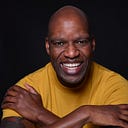Member-only story
Scenes from a Backstage Run-In with Radiohead
When one of your favorite singers can’t take a compliment.
Radiohead’s 1995 sophomore opus, The Bends, is one of my favorite ’90s albums, and like so many of my favorite things, it was a distinct and acquired taste.
The British band’s US label, Capitol Records, sent me an advance cassette (remember those?) a few weeks before its March release, and I received it on the day I was leaving for a week-long vacation in Paris with my boyfriend, who had studied there for a year during college. At the time, I knew Radiohead only through their first (and to date, lone) US hit single, “Creep,” a song I never particularly liked.
The advance arrived at my People magazine office in New York City hours before I was set to take off for my first-ever trip to the French capital. I’m not sure why I chucked it into my carry-on instead of leaving it behind. I had no idea it would end up being the soundtrack to my favorite and most frustrating morning over the next week.
That morning arrived about halfway through the holiday. After getting dressed for an early run, I popped the cassette into my Walkman (remember those?), left my map behind, and set off. Everyone I knew had already fallen for Radiohead via “Creep,” and I figured bringing it along on a long run would force me…
